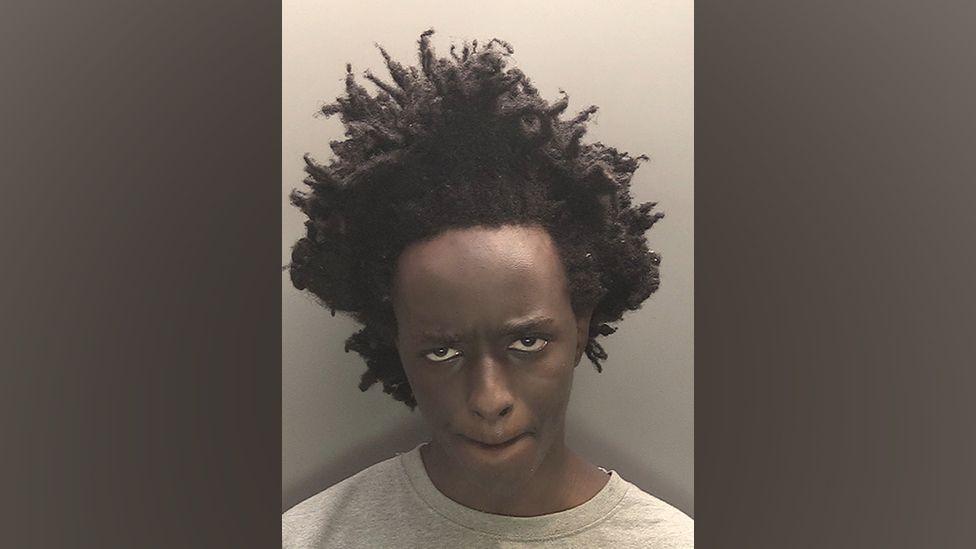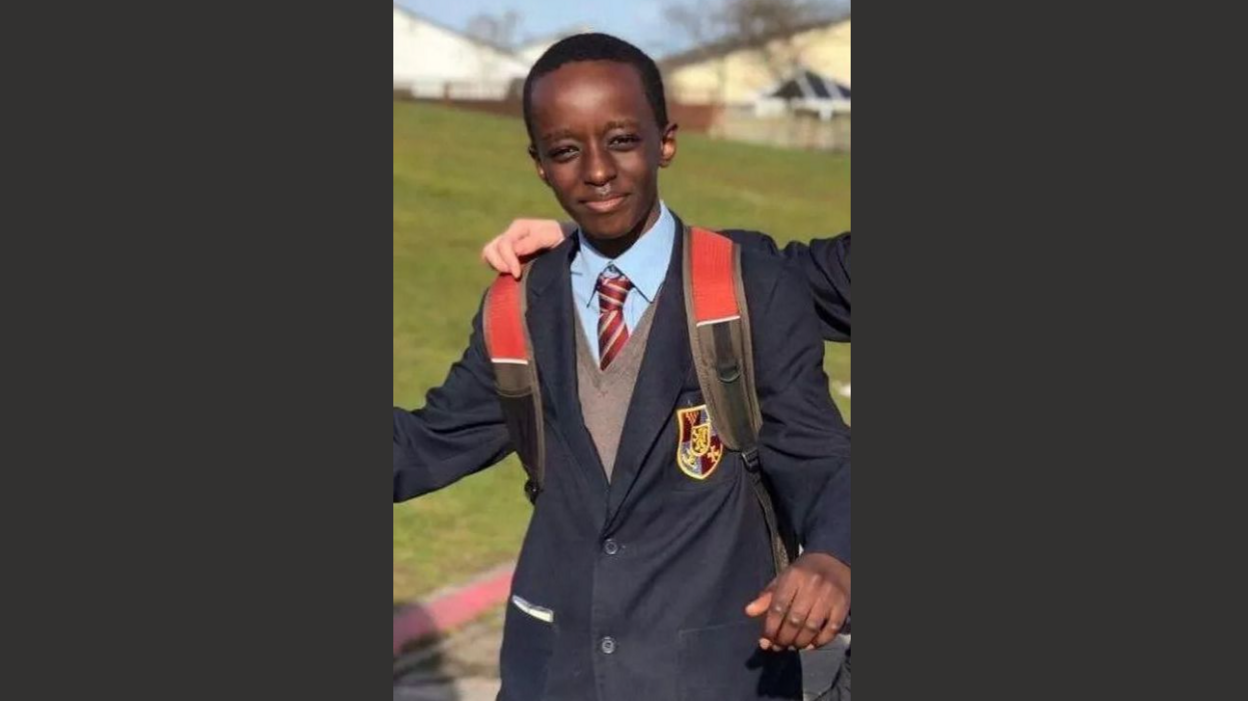Father stopped Southport killer from going to former school a week before attack

Axel Rudakubana will be sentenced on Thursday
- Published
Southport killer Axel Rudakubana was prevented from returning to his former school a week before he stabbed three young girls to death in July last year, the BBC understands.
Rudakubana's father pleaded with a taxi driver not to take him to Range High School, which he was expelled from five years earlier, on 22 July.
He was wearing the same hooded sweatshirt and surgical mask he wore during the attack one week later.
Rudakubana was referred to the government's counter-terrorism Prevent programme three times, between 2019 and 2021, over his general obsession with violence.
On Monday the 18-year-old admitted stabbing three young girls to death at a Taylor Swift-themed dance class last July.
He also pleaded guilty to a range of charges including the attempted murders of eight children and two adults, producing a biological toxin, ricin, and the possession of an al-Qaeda training manual - a terror offence.
Despite this his case has never been treated as terror-related by police as he did not appear to follow an ideology, such as Islamism or racial hatred, and instead appeared to be motivated by an interest in extreme violence.
The home secretary has launched a public inquiry into the attacks to "get to the truth about what happened and what needs to change".
Yvette Cooper said "independent answers" were needed on Prevent and other agencies that came into contact with Rudakubana.
A week before the attack, Rudakubana booked a taxi under the name Simon to Range High School, on what was the last day of term, but his father ran out of the house to intervene.
On 29 July he left his home before ordering a taxi under the same name to take him to the dance class where he carried out the murders.
After he admitted his crimes the Crown Prosecution Service (CPS) described him as a "young man with a sickening and sustained interest in death and violence" and said he had shown no signs of remorse.
Rudakubana was described as having a volatile character, anger issues, and was prone to act with violence.
He attended the Range High School in Formby where he began having problems with violence in Year 9.
Fellow pupils remember him having an obsession with despotic figures including Genghis Khan and Adolf Hitler. He is also known to have accessed information about the IRA.
Rudakubana was excluded from the school in October 2019, aged 13, after which he returned to the school in December 2019 with a hockey stick and assaulted a pupil, breaking their wrist. He had to be restrained by a teacher.
After this, he attended The Acorns School, which provides specialist education for those with extra needs, and was then enrolled in Presfield High School & Specialist College.
He only attended sixth form there for a few days and was largely dealt with by home visits. The school would sometimes ask for police to attend when they visited.
Lancashire Child Safeguarding Partnership said Rudakubana "struggled to re-integrate into school" following his exclusion from Range High.
It also said Lancashire Constabulary responded to five calls from his home address, between October 2019 and May 2022, relating to concerns about his behaviour.
It was revealed last August he had an "autism spectrum disorder diagnosis" and had been "unwilling to leave the house and communicate with family for a period of time".
Rudakubana called Childline several times as a young teenager, eventually telling the service he was going to take a knife into school because of racial bullying.
This was one of the incidents that led to him be excluded from Range High School.
The NSPCC said Rudakubana's last call to Childline was "sufficiently serious to breach a threshold" which led Childline to inform local authorities of its concerns in 2019.
An NSPCC spokesperson said the attack was a tragedy and said it was "vital" that any review that follows the court case examines "all the circumstances and reasons which contributed to this terrible attack" to ensure similar tragedies can be stopped in the future.

Rudakubana was expelled from Range High School in October 2019
Rudakubana was born in Cardiff to Rwandan parents in 2006, and moved to the Southport area in 2013.
He took acting classes at the Pauline Quirk Academy and appeared in a promotional video for BBC Children in Need in 2018, which has since said it had no affiliation with him.
The BBC removed the video from its websites in the wake of the Southport attack.
Neighbours on the street where he and his family lived in Banks, West Lancashire, about 6 miles (9km) from Southport, have told the BBC that the police visited the home on several occasions in the months leading up to the Southport attack.
Minutes before he left to travel to the dance class, Rudakubana is thought to have searched the social media platform X for the 2024 Sydney church attack, in which Bishop Mar Mari Emmanuel and five others were stabbed.
Rudakubana's internet browsing history on a laptop was shortly deleted before he went out.
A doorbell camera caught him pacing outside his family home, before catching a taxi to the dance studio where he would carry out the stabbings.
Bebe King, aged six, seven-year-old Elsie Dot Stancombe, and Alice da Silva Aguiar, aged nine, were all killed.
Police would go on to find in his house another knife and the deadly poison ricin, as well as documents about Nazi Germany, the Rwandan genocide, the wars in Chechnya and Somalia, punishments in slave plantations, and remote-controlled car bombs on Rudakubana's devices.
Also found was a PDF file of an al-Qaeda training manual.
Images relating to the wars in Gaza, Ukraine, Sudan and Korea, as well as images of knives and machetes, were also found on tablets.
Initially, not guilty pleas were entered for Rudakubana, after he refused to speak during a hearing, but these changed to guilty on Monday, the first day of his trial.
He is due to be sentenced on Thursday and is expected to be given a life sentence.
However, he cannot be sentenced to a whole-life term for his crimes because he was 17 when he committed the offences.